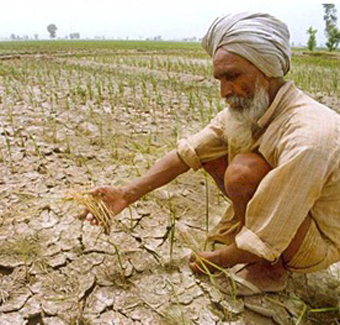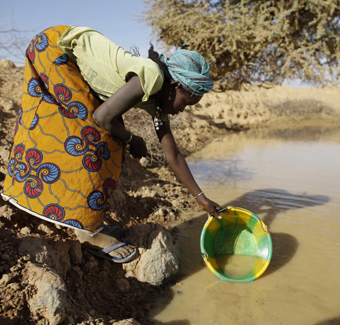Drought and links to other disasters
From Akvopedia
Poverty and food insecurity

Crops are ruined by floods or drought, causing poverty. Photo: Backpacking Tips Asia.
- Drought causes increased poverty and food insecurity. Where drought events often occur with such frequency that people have no time to recover before another drought hits, their usual coping strategies for normal cyclical drought become inadequate. This results in increasing poverty and chronic food insecurity.
- Drought causes decreased agricultural productivity. Increased temperatures cause increased water demand for crops, which may be less available. Recent research into the effects of climate change indicates that even if basic adaptive measures are taken, global agricultural production will decline 3% by 2080 due to increased temperatures. In Kenya, the 1998 – 2000 droughts caused a 15% reduction in agricultural production (5% of which was livestock).
LINKS:
- India poverty.
- Drought‐related food insecurity: A focus on the Horn of Africa. FAO, 2011.
- Drought Deepens Poverty, Starving More Africans.
- SYRIA: Drought pushing millions into poverty .
- Inside Oxfam's work fighting drought and poverty in Somalia.
- Poverty matters blog + Drought.
Gender

Woman collecting water. Photo: Water Aid / Layton Thompson.
- Drought negatively impacts well-being of women and girls who will spend more time collecting firewood, collecting water from increasingly distant sources, attending to sick family members and cultivating land (most agricultural activities undertaken by women).
LINKS:
- Addressing two critical MDGs together: gender in water, sanitation and hygiene initiatives.
- Climate Change (CC), Migration and Gender: Reflections from Balochistan, Pakistan Drought (1998 to 2002).
- Changes in gender-differentiated vulnerability to drought in Nicaragua.
- Gender Dimensions of Drought and Pastoral Mobility among the Maasai.
- Drought and Flooding Risk Assessment Tool for Gender Specific Decision-Making.
- Drought in Kenya through a Gender Lens.
Water wars and conflict

Blue Gold: Water Wars, the movie. Image: Bluegold-worldwaterwars.com.
- Drought can increase conflict. Although complex to link as cause and effect, in some areas (e.g. Darfur) drought has resulted in differing interpretations of rights to access water and land among nomadic and sedentary groups, contributing to the escalation of ethnic tensions.
LINKS:
- Water Wars and International Conflict.
- Water conflict chronology. Worldwater.org.
- The Truth About Water Wars.
- Water, Conflict, and Cooperation. The United Nations and Environmental Security.
- Water War Possible Between India and Pakistan.
- Water Is Running Out: How Inevitable Are International Conflicts? Integrated Regional Information Networks (IRIN)
United Nations.
Hydropower generation
- Drought impacts power generation, industrial production and investment. In Kenya, 26% of all the economic losses during the 1998 – 2000 drought was due to reduction in hydropower generation, while 58% was due to reduction in industrial production, which was the largest sector affected.
LINKS:

